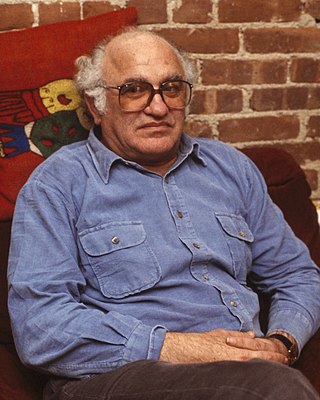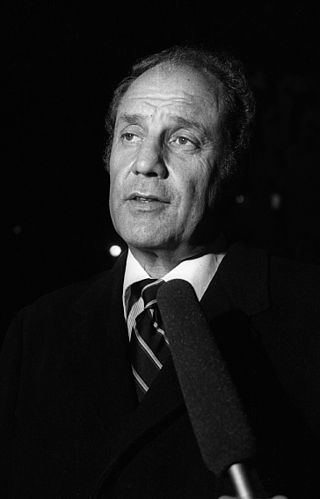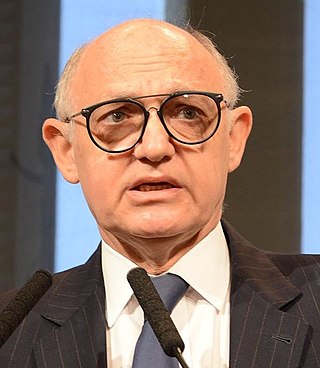
HM Prison Maze was a prison in Northern Ireland that was used to house paramilitary prisoners during the Troubles from August 1971 to September 2000. On 15 October 1974 Irish Republican internees burned 21 of the compounds used to house the internees thereby destroying much of Long Kesh.

Jacobo Timerman, was a Soviet-born Argentine publisher, journalist, and author, who is most noted for his confronting and reporting the atrocities of the Argentine military regime's Dirty War during a period of widespread repression in which an estimated 30,000 political prisoners were disappeared. He was persecuted, tortured and imprisoned by the Argentine junta in the late 1970s and was exiled in 1979 with his wife to Israel. He was widely honored for his work as a journalist and publisher.

Roy Richard Scheider was an American actor and amateur boxer. Described by AllMovie as "one of the most unique and distinguished of all Hollywood actors", he gained fame for his leading and supporting roles in celebrated films from the 1970s through to the early to mid-1980s. He was nominated for two Academy Awards, a Golden Globe Award, and a BAFTA Award.

Rabbi Marshall T. Meyer was an American Conservative rabbi who became a recognized international human rights activist while living and working in Argentina from 1958 to 1984, during the period of the "Dirty War" in the 1970s. He was elected by president Raúl Alfonsín to be one of the members of the National Commission on the Disappearance of Persons. After the restoration of democracy in 1983, Meyer was awarded the nation's highest honor, the Order of the Liberator General San Martín, by the new president.

A prison cell is a small room in a prison or police station where a prisoner is held. Cells greatly vary by their furnishings, hygienic services, and cleanliness, both across countries and based on the level of punishment to which the prisoner being held has been sentenced. Cells can be occupied by one or multiple prisoner depending on factors that include, but are not limited to, inmate population, facility size, resources, or inmate behavior.
Bradley Ira Fiedel is an American composer who has composed scores for film and television. He is known for his collaborations with director James Cameron on The Terminator (1984) and its sequel Terminator 2: Judgment Day (1991), as well as the action-comedy True Lies (1994). On these scores he mostly used synthesizers, but composed a number of scores utilizing various acoustic instruments, including full orchestra.

The Ministry of Public Security Qincheng Prison is a maximum-security prison located in Qincheng Village, Xingshou, Changping District, Beijing in the People's Republic of China. The prison was built in 1958 with aid from the Soviet Union and is the only prison belonging to China's Ministry of Public Security. The Ministry of Justice operates other non-military prisons.
The blanket protest was part of a five-year protest during the Troubles by Provisional Irish Republican Army (IRA) and Irish National Liberation Army (INLA) prisoners held in the Maze prison in Northern Ireland. The republican prisoners' status as political prisoners, known as Special Category Status, had begun to be phased out in 1976. Among other things, this meant that they would now be required to wear prison uniforms like ordinary convicts. The prisoners refused to accept the administrative designation of ordinary criminals, and refused to wear the prison uniform.
Christian Federico von Wernich is an Argentine Roman Catholic priest and a former chaplain of the Buenos Aires Province Police while it was under the command of General Ramón Camps, during the dictatorial period known as the National Reorganization Process (1976–1983). Wernich worked in Miguel Etchecolatz's Direction of Investigations of the provincial police with the rank of Inspector. He became internationally known in 2006 after being indicted for murder and kidnapping in aid of the military junta; he was convicted at trial in October 2007 and sentenced to life imprisonment.
The Andinia Plan is a conspiracy theory that alleged plans to establish a Jewish state in parts of Argentina and Chile. It is partly based on an exaggeration of historical proposals for organized Jewish migration to Argentina in the late 19th and the early 20th century. The name and contents of the plan have wide currency on some circles of the Argentinian and Chilean right-wing, but no evidence of its actual existence has ever been brought up, making it, according to the US-based Anti-Defamation League and the Israeli research institute Jerusalem Center for Public Affairs, an example of a conspiracy theory.

Ramón Juan Alberto Camps was an Argentine general and the head of the Buenos Aires Provincial Police during the National Reorganization Process (1976–1983). Although he was found guilty of multiple crimes, he was first amnestied and then pardoned.

The history of the Jews in Argentina goes back to the early sixteenth century, following the Jewish expulsion from Spain. Sephardi Jews fleeing persecution immigrated with explorers and colonists to settle in what is now Argentina, in spite of being forbidden from travelling to the American colonies. In addition, many of the Portuguese traders in the Viceroyalty of the Río de la Plata were Jewish. An organized Jewish community, however, did not develop until after Argentina gained independence from Spain in 1816. By mid-century, Jews from France and other parts of Western Europe, fleeing the social and economic disruptions of revolutions, began to settle in Argentina.
This is a list of movies that are related to the military dictatorships in Latin America and Caribbean that appeared during the context of the Cold War.
La Opinión was an Argentine newspaper, founded by the journalist Jacobo Timerman in 1971. Its ideology was broadly centrist, inspired partly by the Paris daily Le Monde.

Héctor Marcos Timerman was an Argentine journalist, politician, human rights activist and diplomat. He served as his country's Minister of Foreign Affairs from 2010 to 2015, during the presidency of Cristina Fernández de Kirchner.
Ernest Warren Lefever was an American political theorist and foreign affairs expert who founded the Ethics and Public Policy Center in 1976 and was nominated for a State Department post by President Ronald Reagan. After his nomination was rejected by the Senate Foreign Relations Committee he formally withdrew his nomination.
Jacobo is both a surname and a given name of Spanish origin. Based on the name Jacob. Notable people with the name include:

El Mundo was a daily morning paper published in Buenos Aires, Argentina by Editorial Haynes company. It was launched on 14 May 1928 and circulated until mid-1967, when there was an unsuccessful attempt to convert it into an evening paper. Its publication during the Infamous Decade (1930–1943) provided reporting at a time of instability and repression. After Juan Perón's election in 1946, the publishing company was taken over by Peronistas, who forced the paper to take their line.

Prisoner Without A Name, Cell Without A Number is a 1981 memoir by the left-wing Argentine journalist and publisher Jacobo Timerman, who was imprisoned without charge during the Dirty War in Argentina in April 1977 and subsequently tortured. Though acquitted by a military court in October 1977, Timerman was kept under house arrest after his release in April 1978 until his deportation to Israel in September 1979.
The Torture Camp on Paradise Street is a memoir by Ukrainian journalist Stanislav Aseyev relating his detention in the Izolyatsia concentration and torture camp in Russian occupied Ukrainian city of Donetsk between 2015 and 2017. The camp is operated by the Russian Federal Security Bureau (FSB) and is notorious for torture, rape, and psychological abuse that the prisoners are subject to.











